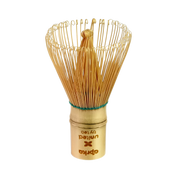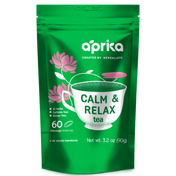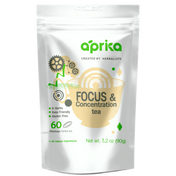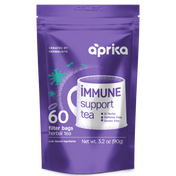We all love matcha, for good reason. It's not just a smooth and comforting way to start your mornings; it also comes packed with health benefits that might make you love it even more. Whether you're already enjoying it daily or just starting to explore what matcha is all about, this blog will deepen your appreciation and maybe even turn it into a full-on ritual. Let's dive in.
What Is Matcha?
Matcha is a kind of green tea, but it's a little different from the loose-leaf version we are used to. Instead of steeping the leaves like you would with regular tea, matcha is made from whole tea leaves that are finely ground into a soft, bright green powder. When you drink it, you're actually drinking the entire tea leaf, which is why it's packed with so much more of the good stuff.
It has a smooth, earthy flavor that can be grassy, a little creamy, and sometimes even slightly sweet, depending on how it's made. The leaves are grown in the shade before harvest, which helps them hold on to more nutrients and gives matcha its deep green color and rich taste. It's been part of Japanese tea culture for hundreds of years, often used in quiet, meditative rituals, but more recently, people around the world have embraced it, adding matcha to everything from matcha lattes to smoothies.
At its heart, matcha is simple: just water and tea, but it carries a calm kind of energy that sticks with you in the best way.
The Health Benefits of Matcha
Matcha has quickly become a favorite, not just for its taste and versatility, but because it's loaded with health benefits too. This antioxidant-rich green tea powder supports both your mind and body. It can help with focus and productivity, but its potential health benefits go far beyond that, contributing to everything from heart health and metabolism to oral health and even your skin. Let's take a closer look at what matcha can do.
Boosts Metabolism
One of the most well-known benefits of matcha is its ability to support metabolism. Matcha has been shown to increase fat oxidation (the process of burning fat for energy) during exercise, helping with weight management and overall body composition. It can also boost your metabolic rate, helping your body burn more calories throughout the day, even when you're at rest. This metabolic boost, combined with a balanced diet and exercise, can make matcha a great tool for those looking to support healthy weight loss.
Good for Heart Health
Matcha is rich in catechins, a group of antioxidants that play a significant role in promoting heart health. Specifically, the antioxidant EGCG (epigallocatechin gallate) has been linked to lower levels of LDL (bad) cholesterol, improved blood circulation, and better overall heart function. Some studies suggest that regular consumption of matcha may help reduce the risk of heart disease by supporting healthy blood pressure and lowering inflammation in the body. It's also been shown to help balance blood sugar levels, which is important for overall cardiovascular well-being.
Rich in Antioxidants
One of matcha's standout features is its incredible natural antioxidant content. Because matcha powder is made from the whole leaf, it's packed with more antioxidant properties than traditional green tea. These antioxidants help protect your body's cells from oxidative stress caused by free radicals, which are unstable molecules that can damage cells and contribute to aging and various health conditions. The high levels of catechins in matcha, particularly EGCG, also support a healthy immune system, fight inflammation, and may even help with detoxifying the body naturally.
Supports Oral Health
Matcha's natural antibacterial and anti-inflammatory properties can help keep your mouth healthy. The catechins in matcha help reduce the growth of harmful bacteria in the mouth, which may aid in preventing issues like bad breath, gum disease, and even cavities. Regular consumption of matcha can help keep your mouth feeling fresh, and because it's low in sugar, it's far better for your teeth than sugary beverages. It also has natural fluoride, which can help strengthen tooth enamel and support overall oral hygiene.
May Help With Skin Clarity
Matcha's antioxidant and anti-inflammatory properties don't just benefit your internal health; they can also support your skin. When consumed regularly, matcha has been shown to help fight the oxidative stress that leads to premature aging. The catechins and polyphenols in matcha may also help reduce inflammation in the skin, which can help with conditions like acne, redness, and puffiness. In addition, some people use matcha topically in face masks, as its antioxidants may help improve skin texture, reduce blemishes, and protect against UV damage.
Hydrates and Detoxifies
While hydration is key to overall health, matcha can also act as a natural detoxifier. Its high chlorophyll content (from the way it's grown in the shade) helps cleanse the body by promoting the elimination of toxins. Drinking Japanese matcha regularly supports the body's natural detox processes, which may contribute to clearer skin, improved digestion, and better overall health. Its natural alkalizing effects may also help balance your body's pH levels, promoting better general wellness.
Supports Focus and Calm Energy
Matcha gives you a unique kind of boost thanks to its mix of caffeine and L-theanine, an amino acid naturally found in green tea. Unlike coffee, which can hit you with a quick rush of energy, matcha provides a steady, gradual lift that lasts longer. The L-theanine helps calm the usual restlessness that comes with caffeine, keeping you focused and relaxed at the same time. It's this balance that makes matcha green tea perfect for staying sharp, whether you're diving into a big project or just enjoying a moment of mindfulness.
New to Matcha? Start Here
We hope learning about matcha's many health benefits has made you as excited about it as we are. To help you bring it into your routine without any fuss, we're sharing two beginner-friendly recipes that are easy to make and a great way to enjoy matcha daily.
Traditional Usucha (Thin Tea) Recipe
Ingredients:
- 1-1.5 tsp high-quality matcha
- 2-3 oz (60-90 ml) hot water (175°F / 80°C)
Equipment:
- Matcha bowl
- Bamboo matcha whisk (chasen)
Instructions:
- Preheat your matcha bowl: Pour hot water into the bowl, swirl it around to warm the sides, then discard the water.
- Add 1-1.5 teaspoons of matcha powder to the warmed bowl.
- Carefully pour 2-3 ounces of warm water (175°F or 80°C) over the matcha powder.
- Using your bamboo whisk, whisk the matcha and water together in a zig-zag motion until a frothy layer forms on the surface.
Tip: The key to a perfect Usucha is in the whisking! Whisk briskly and continuously until you achieve a smooth, frothy consistency with minimal lumps.
Remember: Making usucha is an art that takes practice. Adjust your Japanese matcha powder and water quantities to find your perfect balance and preferred taste. Enjoy your cup of matcha by taking small sips!
Creamy Matcha Latte Recipe
Ingredients:
- 1 teaspoon Matcha Green Tea Powder
- ¼ cup hot water (160–180°F)
- ¼ cup warmed milk (soy, cashew, coconut, or any milk of choice)
- Optional: sweetener of your choice (to taste)
- Optional: vanilla bean or cinnamon (for added flavor)
Instructions:
1. Prepare the Matcha
- Sift the matcha powder into a large mug to remove any lumps.
- Add hot water to the matcha. Using a matcha whisk (or a small kitchen whisk), whisk briskly in an up-and-down motion for about 30 seconds until the mixture becomes frothy.
2. Add Milk
Pour warm milk over the frothed matcha tea. Taste and adjust flavors by adding vanilla, cinnamon, sweetener, or additional water or milk as desired.
3. Blender Method (Alternative)
If you don't have a whisk, combine milk, matcha powder, sweetener (e.g., honey or agave nectar), and vanilla in a blender. Cover and blend on high until the mixture is creamy and frothy.
Cold Latte Option
Add the ingredients and a handful of ice to a jar for an iced matcha latte. Cover and shake vigorously until well combined.
Tip for the Perfect Latte
Water Temperature: Keep the water between 160–180°F to avoid a bitter, burnt taste. A good tip is to let your kettle boil and cool for a few minutes before adding it to the matcha powder.
Enjoy your creamy, flavorful Matcha Latte!
Getting the Most Health Benefits From Your Matcha
Matcha is one of those rare things that's both simple and rewarding, it's easy to make, gentle on your system, and brings along a wide range of health benefits. Whether you're in it for the calm focus, the antioxidant boost, or just the comfort of a warm, green cup, it fits easily into any routine.
As you start exploring, you'll come across different grades of matcha. Ceremonial grade matcha is the highest quality, known for its smooth texture, vibrant color, and delicate flavor perfect for drinking on its own with just water. Culinary grade matcha, on the other hand, has a bolder taste that holds up well in recipes like lattes, smoothies, or even baking. Both have their place, and the right one for you really depends on how you enjoy your matcha.
If you're curious to learn more about the differences, head over to our blog post: Ceremonial vs. Culinary Matcha: Which One's Right for You? It breaks everything down so you can choose with confidence.








